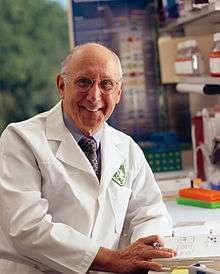Steven Rosenberg
| Steven Rosenberg | |
|---|---|
 | |
| Born | August 2, 1940 |
| Alma mater |
The Johns Hopkins University Harvard University |
| Thesis | The proteins of human erythrocyte membranes (1969) |
| Notable awards |
Medal of Honor, American Cancer Society 2015 Keio Medical Science Prize 2012 William B. Coley Award for Distinguished Research in Tumor Immunology, Cancer Research Institute 2011 |
Steven A. Rosenberg (born 2 August 1940) is a Jewish American cancer researcher and surgeon.
Methodology
He is credited with developing the use of IL-2 and immune cells for the treatment of patients with melanoma in a procedure termed adoptive cell transfer. He has shown that expanding immune cells (known as tumor infiltrating lymphocytes) in the lab can be used to treat patients with melanoma and has published two important studies describing their use. The first in 2002, demonstrated that some patients with advanced melanoma can be treated to complete remission with a combination of chemotherapy, immune cells and high doses of IL-2.[1] The second, in 2006, demonstrated that the receptor of T cells can be transferred to immune cells and in combination with chemotherapy and high doses of IL-2 can be used to treat patients with melanoma.[2] Although, this was the first time that the T cell receptor was used for gene therapy, it was not the first time that gene therapy was used in cancer. Tumor cells modified with a gene for immune growth factors such as GM-CSF, had been used many years previously and continue to be used, although the efficacy of GM-CSF modified tumor lines as a cancer vaccine remain extremely modest, at best.[3] There has been some debate as to the role of the T cells in treating the cancer in these studies as high-dose IL-2 and chemotherapy have also been shown to have anti-cancer properties. Nevertheless, the combination of chemotherapy, T cells and high-dose IL-2 was shown to be effective even in patients who had previously failed high-dose IL-2 treatment.
Rosenberg has pioneered the use of adoptive immunotherapy.
Education
Rosenberg received his B.A. (biology, 1960) and M.D. (1963) degrees from The Johns Hopkins University. He served a surgical internship and residency at the Peter Bent Brigham Hospital, completing it in 1974. During his residency he also earned a Ph.D. in biophysics from Harvard University with thesis titled The proteins of human erythrocyte membranes (in 1969). Following the completion of his surgical residency, he became the Chief of Surgery at the National Cancer Institute a position he continues to hold. His research has focused on the immunotherapy of cancer.
References
- ↑ Dudley ME, Wunderlich JR, Robbins PF, et al. (October 2002). "Cancer regression and autoimmunity in patients after clonal repopulation with antitumor lymphocytes". Science. 298 (5594): 850–4. doi:10.1126/science.1076514. PMC 1764179
 . PMID 12242449.
. PMID 12242449. - ↑ Morgan RA, Dudley ME, Wunderlich JR, et al. (October 2006). "Cancer regression in patients after transfer of genetically engineered lymphocytes". Science. 314 (5796): 126–9. doi:10.1126/science.1129003. PMC 2267026
 . PMID 16946036.
. PMID 16946036. - ↑ Jaffee EM, Hruban RH, Biedrzycki B, et al. (January 2001). "Novel allogeneic granulocyte-macrophage colony-stimulating factor-secreting tumor vaccine for pancreatic cancer: a phase I trial of safety and immune activation". Journal of Clinical Oncology. 19 (1): 145–56. PMID 11134207.
External links
- Gene therapy rids men of cancer, BBC News (2006 coverage of cancer breakthrough discovered by his team)
- "Cancer Miracles", Robert Langreth, Forbes, 2009